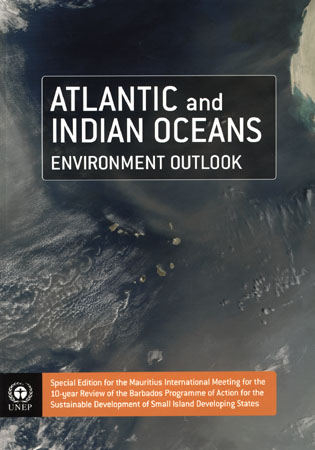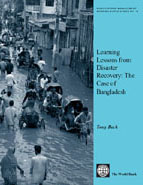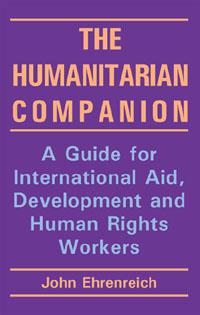|
|

|
These publications may be of interest to our readers. ADPC's Information
and Knowledge Management Unit can offer assistance in locating them.
Atlantic and Indian Oceans Environment Outlook, Special Edition for the Mauritius International Meeting for the 10-year Review of the Barbados Programme of Action for the Sustainable Development of Small Island Developing States.
UNEP, 2005, ISBN 9-2807-2525-4, 84 pages, Serial Number 05.II.D.6, USD 20.00. To order write to
publications@un.org for the 10-year Review of the Barbados Programme of Action for the Sustainable Development of Small Island Developing States.
UNEP, 2005, ISBN 9-2807-2525-4, 84 pages, Serial Number 05.II.D.6, USD 20.00. To order write to
publications@un.org
The Atlantic and Indian Oceans Environment Outlook is part of a UNEP project to produce state of the environment assessments for the Caribbean, Pacific and the Atlantic and Indian Oceans Small Island Developing States (SIDS). The main objective of these reports is to highlight the state of the environment in the SIDS, help identify regional environmental concerns and provide policy guidance.
Learning Lessons from Disaster Recovery: the Case of Bangladesh. Tony Beck, 2005, ProVention Consortium and the World Bank Hazard Management Unit, Working Paper Series No.11. The publication can be freely downloaded from the ProVention website at:
http://www.worldbank.org/hazards/files/bangladesh.pdf
or write to
hazardmanagement@worldbank.org 
This report is part of a ProVention Consortium initiative aimed at learning lessons from recovery efforts following major natural disasters. It summarizes the findings of a country case study on Bangladesh, with a particular focus on the recovery of poorer households, and lessons from the recovery period following the 1998 floods. Main lessons learned from this study address policy and planning, and best ways to supporting livelihoods.
Learning Lessons from Disaster Recovery: the Case of Mozambique. Edited by by Peter Wiles, Kerry Selvester, Lourdes Fidalgo, 2005, ProVention Consortium and the World Bank Hazard Management Unit, Working Paper Series No 12. The publication can be freely downloaded from the ProVention website at:
http://www.worldbank.org/hazards/files/mozambique.pdf
or write to
hazardmanagement@worldbank.org
This report focuses on Mozambique a post-conflict country faced with major natural disasters. It also offers an example of recovery in an extremely poor and primarily subsistence livelihood population, but in a country favored by donors and receiving substantial amounts of both relief and recovery assistance. The review provides an overview of the recovery processes and highlights livelihoods and agriculture.
Surviving Disasters and Supporting Recovery: A Guidebook for Microfinance Institutions.
Eileen Miamidian, Margaret Arnold, Kiendel Burritt and Marc Jacquand, World Bank and UNCDF Microfinance, Disaster Risk Management Working Paper Series No. 10. The publication can be freely downloaded from the ProVention website at:
http://www.proventionconsortium.org/files/disasterguidefinal.pdf
or write to
hazardmanagement@worldbank.org
This guide seeks to assist MFIs in defining an institutional strategy for disaster preparedness. It lays out the steps for assessing the potential risk of disaster, the clients’ needs and the institutional capacity to respond. Organized as a series of exercises and reference tools to assist MFIs to plan and implement a disaster management strategy, it also helps MFIs assess the risk of a disaster, their client’s needs and their own institutional capacity to respond. Finally, it offers guidance for preparation, response and recovery. The guide addresses the following topics in this sequence: assessment of risk, institutional preparedness, client preparedness, emergency response and recovery. Institutions preparing in advance for natural disasters will find this a useful guide.
 The Humanitarian Companion: A Guide for International Aid, Development and Human Rights Workers.
John H. Ehrenreich, March 2005, ISBN 1-8533-9601-x, ITDG Publishing, 224 pages
GBP16.95. Order online at
http://www.developmentbookshop.com/
or via email
atorders@itpubs.org.uk
The Humanitarian Companion: A Guide for International Aid, Development and Human Rights Workers.
John H. Ehrenreich, March 2005, ISBN 1-8533-9601-x, ITDG Publishing, 224 pages
GBP16.95. Order online at
http://www.developmentbookshop.com/
or via email
atorders@itpubs.org.uk
This book will help humanitarian and aid workers, and those training them, prepare both practically and emotionally for the wide range of challenges, dangers and insecurities that are an everyday part of their work. It starts with issues to consider before you start out, then deals with safety and security in the field, staying healthy, managing stress, coping with the trauma of others, and dealing with returning home at the end of an assignment. An extensive appendix includes a checklist of 'what to do and what to take with you', a brief first aid manual, and other practical information and advice. This book will be a welcome companion for all humanitarian workers and an essential tool for those training them.
Sustainability Assessment: Criteria, Process and Applications. Robert B Gibson, 2005, ISBN 1-8440-7051-4, Earthscan 240pages, GBP 22.95. Order from
orders@earthscan.co.uk
Many governments express commitments to sustainability, yet until now assessing sustainability in projects, plans,
programs and policies has been largely limited to traditional environmental assessment (EA) with an imperfect attempt to staple on biophysical and socio-economic considerations. While traditional EA focuses on mitigating negative effects, achieving true sustainability demands that each new undertaking make a positive contribution to desirable and durable futures. This onerous goal can only be achieved if decision makers are able to consciously and publicly specify and use
sustainability-centered criteria to justify options and to weigh trade-offs. Sustainability Assessment covers all aspects of the core requirements of sustainability including the creation of basic criteria, handling tradeoffs, practicalities in application, implications for process design and uses in decision-making, as well as examining the range of tools and innovative examples available to assist implementation of sustainability assessment.
WHO Resource Book on Mental Health, Human Rights and Legislation. 2005, ISBN 9-2415-6282-X, Order No. 11500611, World Health
Organization, 197 pages, USD 45.00/ CHF 25.00 (for developing countries). Order online at
http://bookorders.who.int
or write to
bookorders@who.int
Mental health laws are an essential means of promoting and protecting the rights of people with mental disorder, but despite this, countries all over the world fail to legislate effectively, if at all, in this area. The WHO Resource Book on Mental Health, Human Rights and Legislation brings together important information on international human rights standards related to mental health. It provides practical guidance on key issues that countries need to consider and incorporate into their national mental health laws, as well as useful strategies to facilitate the development, adoption and implementation of the laws. It also contains a checklist on mental health legislation which countries can use to review the comprehensiveness and adequacy of existing mental health legislation and to help them in the process of drafting a new law.
|

